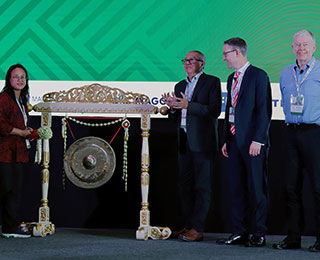The Associação Brasileira de Cimento Portland (ABCP) and Sindicato Nacional Da Indústria Do Cimento (SNIC) will host the 6th Congresso Brasileiro Do Cimento, 19-21 May 2014, in São Paulo, Brazil.
Approximately 350 industry professionals, university researchers and representatives of Latin American cement groups will participate in the event. The focus of the congress is cement manufacturing innovations, with themes relating to competitiveness, emissions, environmental controls, cement standardisation and quality. The meeting will also debate the future direction cement production should take.
ICR spoke with Mr Hugo Rodrigues, ABCP’s director of communications, about his hopes for the congress and his future expectations for Brazil’s cement market.
ICR: What is the programme of the Brazilian Congress of Cement ?
HR: The sixth congress will take place over two-and-a-half days in May, with plenary activities (conferences and seminars) and the simultaneous parallel exhibition with 40 stands for companies providing services, products and equipment for cement manufacture where they can exhibit industry innovations. The themes of the 2014 CBC are:
1. The maintenance, modernisation and expansion of cement plants
2. Innovation in cement manufacturing processes
3. Climate change and the environment: emission control and methodology, reverse logistics, legislation, terrain recovery and other subjects
4. Standardisation and quality of Portland cement
5. Energy and fuel: co-processing, blending and others
6. Refractories: products and processes
7. Pollution control equipment: on-line analysers
8. Weighing systems and transportation
9. Crushing and grinding systems: mills, grinding balls and others
10. Cement and sustainable building.
ICR: With the last congress held in 1999, why has ABCP gone for so many years without a CBC?
HR: In the early 2000s, the ABCP turned its attention more to cement and concrete product technology. We devoted ourselves to the development and application of constructive, cement-based systems. Of course we continue to take care of this area, but at that time we decided to fully concentrate on it. The Brazilian industry was already modernised and consolidated then, and had less demand for technical forums. This situation resulted in less need to host the event for a while.
ICR: What does this sixth edition of the congress mean to ABCP and its associates?
HR: To engage in something that is in the scope of the ABCP's usual activities and also to provide our associates with the opportunity to acquire more knowledge on innovations, as well as to establish contact with experts on national and international levels. This is especially required today, when there are significant investments occurring in the expansion and modernisation of the nation's cement sector. So, to have these innovations all gathered together, in the same place, simultaneously, will offer a wide coverage of knowledge about production quality and environmentally-friendly innovations to participants.
ICR: In the past the event was formatted to cater solely to cement groups operating in Brazil, is this still the case?
HR: Yes, the congress was designed for professionals and cement manufacturers operating in Brazil. Among these groups there are major global players like Holcim and Lafarge, as well as Brazilian groups that today are multinationals such as Votorantim and InterCement.
For this reason, the congress may generate interest with other foreign groups and there is no problem with their participation. However, we stress that the event was designed to cater for those who already work in Brazil.
On the other hand, we do expect a strong presence of foreign equipment suppliers, as Brazil currently attracts attention with its resumption of construction, with works in infrastructure and housing and their increasing demands for cement. But current domestic production and the investments that are being made today will already provide for all of Brazil's cement needs.
ICR: Will the contents of the congress be restricted to technical issues or is there room for commercial actions and lectures?
HR: The congress will be both techno-scientific as well as techno-commercial in face of the necessary and important presence of the industry suppliers. This composition of subjects is what makes the event even more interesting by allowing to see, in practice, the performance of the proposed solutions.
ICR: What should participants expect from the congress in terms of innovation?
HR: Although it is premature to say what one could expect, we find that subjects like emission control, alternative fuels, waste co-processing, standardisation and products, and differentiated levels of additives will be greatly explored in the congress, due to their impact on the competitiveness of the sector. But surely there will be other subjects. As the initial interest since the launch of the CBC has been great, I believe exhibitors will present many innovations for this event.
ICR: Will academic research on cement and co-processing of waste be part of the congress?
HR: No doubt, mainly because the ABCP and the Brazilian cement industry have a lot of experience in these matters and will share them at the CBC.
ICR: How can exhibitors participate?
HR: Apart from the possibility of registration of its professionals at the event, exhibitors can take part of the parallel exhibition with their stands, some of which bring additional benefits such as the possibility of presentations in the plenary. Another way is by acquiring sponsorship quotas for certain activities that are part of the congress, which allow the positioning of the company's brand.
For more information, visit the website for the 6th Congresso Brasileiro Do Cimento.
